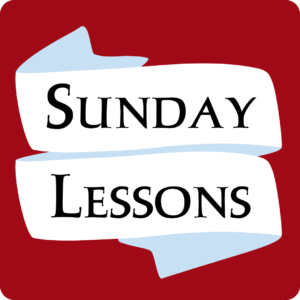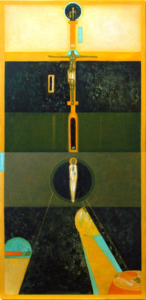Worship Guide for March 9, 2025
Like TV Guide, but from God! Find the text of the Prayers of the People and Sermon below. Use the buttons provided to find other worship materials.
To see the Worship Guide for other weeks, click here.
Prayers
Weekly Prayer List Recording:
Prayers of the People (Sunday):
First Sunday of Lent
March 9, 2025
Sermon Recording:
Hope is What We Do in the Wilderness
K Casenhiser
Hope is what we do.” – Reverend Dr. Fadi Diab, Anglican priest from St Andrew’s Ramallah in Palestine.
Sermon audio
May the words of my mouth and the meditations of my heart be ever acceptable to you, Lord, our Rock, and our Redeemer. In the name of the Creator, the Redeemer, and the Sustainer, Amen.
Hope is what we do. This is what the Reverend Dr. Fadi Diab, Anglican priest from St Andrew’s Ramallah in Palestine said to our gathered community at Berkeley Divinity School on Monday morning. He and his wife Ruba who is the director of the orphanage in Ramallah now seeking homes for the more than 16,000 children orphaned by the genocide, said we are rebuilding Gaza in these ruins and this is our hope. Father Fadi went on to express, I’m not terribly interested in what you believe, I care deeply about what you do with what you believe. Hope is what we do with what we believe in the ruins. If hope is what we do, how do we practice hope in these times that seek to obilterate and erase bodies and lands? What does the Gospel give us to do with what we believe in this ruinous wilderness? Often, you only know what you will do with what you believe when you are tested, as Jesus is today in the wilderness. I believe our Gospel reading suggest that like Christ, we demonstrate hope by practicing Christian resistance with our words and with our actions. When the devil, the Accuser, visits, and they will, we practice hope as Christian resistance when we stand up, speak back, and say, no, this is not what is written. And we can only do this when we come down the mountain. Lent is about practicing Christian resistance in the land of immanence with our voices and commitments now because this is the opportune time.
Last week, when we celebrated the final Sunday after the Epiphany, we ascended to the top of the mountain with Jesus, Peter, John, and James. We watched as they marveled at Christ’s radiance and longed to remain with him on that glorious summit. But the summit, is not the wilderness. We witnessed, then, as Jesus told his beloved disciples that no matter how much they desired to stay with him on the mountaintop, the kingdom’s work is to ascend only so that you can descend again. Descending and meeting the crowd, the mess, and the reality of life as is is where the kingdom gets real. In other words, the kingdom gets real in the wilderness where we are asked what we will do with what has been revealed to us on the mountaintop. We practice Christian resistance when we remain with Jesus in the transcendence and the immanence. Lent is a season of practicing Christian resistance with what is imminent. Fittingly, then, we begin Lent in the wilderness.
Let’s locate ourselves a little more precisely. Now, on this first Sunday of Lent, Christ begins his descent from the mountain to the cross. We walk with Christ from the transfiguring events on the holy mountain to the harrowing gallows of Golgotha, to the hallowing separation on Holy Saturday, to the transfixing wonder of the empty tomb we celebrate on Easter Vigil in the early hours of Sunday morning. The resurrection begins here, now, in the wilderness. At this moment, Jesus fixes his face towards Jerusalem. Here, we orient to the path that pierces through the heart of our faith and tradition— the Passion— and the Passion is an account of Christ resistance. It’s where we see what Love does when it is tested. This morning, we see the Holy Spirit who drove Christ out into the wilderness just after his baptism in the River Jordan preparing Christ for the tests of the Passion to come now in wilderness. In Lent, we traverse the wilderness with Christ and reckon with the weight and wonder of immanence: the space of the suspended alleluia where we practice holiness amid the world as it is, a practice of faith with asks us to examine the internal and external systems that obstruct us from witnessing to the Gospel, from practicing hope by living what we believe. Living what we believe when we are tested is hard work. The good news is we don’t do it alone and we musn’t attempt to. The Holy Scriptures, the Holy Spirit, and the gathered community help us remember the symbols, stories, and spiritual values in our ancestries and histories so that we can be fortified to do the work of imagining the kingdom for which God longs.
As we see with Jesus’s dance with the devil in today’s Gospel, the wilderness is a crucible. It is a testing ground that brings us face to face with what we resist and with what we need to sustain the practice of Christian resistance. It is the training ground for Christian witness. Practice–what we do with what we believe–makes Lent ascetic. Ascetic comes from the Greek áskēsis, which means to train. Lent’s invitation is to train in practicing what we believe when we are tested. We do this by standing in the revelation of the Gospel as good news rather than yielding to the Accuser’s spectacles. As Father Fadi reminded us, hope is what we do with what we believe, and what we believe resits what the Accuser taunts us with. Remember what Jesus says to the devil: “Do not put the Lord your God to the test.” Jesus’s rebuke almost sounds like: “Don’t push it. Just watch what God will do.” Watch what God did do.
On Ash Wednesday, we entered an ascetic season of training to push back; to remain with Jesus even when we want to run or give up entirely. When we stand with Jesus, we practice Christian reisistance.This season extends an opportunity to practice remaining in the work of bringing the kingdom to bear now by resisting the urge to resolve the mess of the world as we find it. Christ does not ask us to resolve the mess of the world. After all, when the devil leaves Jesus, they only depart temporarily until another opportune time.
Demons will come again our tradition tells us that is a reality. Therefore, Lent becomes a critical site where we rekindle our Christian imagination by recommitting to the meaning of our baptism and returning to the memory that with water and with ashes we are marked as Christ’s own. These forty days, I wonder if we can reckon with what it looks like for us, the Church, to be a body of Christian resistance. I wonder if we can be a body that resists all that ruptures wholeness rather than repairs it; be a body who presses against the structures of sin that separate, debase, and justify the deaths of some for the benefit of others. I believe Lent is about saying no with our bodies and souls to these forces of death. I believe our tradition calls us to speak back to these forces as Christ did when satan, the accuser, offered him more power in the wilderness. When we say no to death with our lives, we practice Christian resistance and affirm that the good news of the kingdom is tangible for everybody now. Right now, there is another way to live, and it is already available to us. In this way, resistance says no to the myth of powerlessness because Christ is God’s yes to us, which empowers us to act for justice, mercy, and compassion as Christ did when he was tested. In Christ’s life, death, and resurrection, God says to the creation whom God loves: I am with you all the way. This is what solidarity looks like, and we need to say to each other in these days of terror: God is with you all the way, and so am I.
Therefore, this is not the moment to give up. It is the moment to lean in and ask: what does our faith ask of us know? What must you leave behind, and what must you carry as strength for the journey? Where do you get stuck, and what resources do you have in our faith, our community, and your body to muck out of the mud and keep moving? These are ascetical questions to live so that we are ready to act our resistance with love when evil visits.
Weeks after the inauguration, Christian Century published an article titled “What does it mean to be a Christian in these times?” It is by the Episcopal priest and theologian Rev. Dr. Kelly Brown Douglas. In it, she wrote: “A kairos time is a right or opportune time. It is a decisive moment in history with the potential for far-reaching impact. It is often a chaotic time, a time of crisis. Yet it is a time when God is fully present, providing an opening, a way to God’s future. In their 1985 Kairos Document, South African clergy and theologians called it a “moment of grace and opportunity, the favourable time in which God issues a challenge to decisive action.” Every time is a kairos time.”
If every time is kairos time, then this Lent is a kairos moment. God is issuing us a decisive action to practice Christian resistance by descending the mountain and resisting the myth that the only narrative available to us is the news. The pressures of evil can feel unbearable in polycrises (the reality of being in multiple crises at once) and we are in them. When faced with these crises, the decisive action is to remain with Christ: to not to give up. Who will bring a counter-narrative of humanity and healing and possible futures if not us, the Church? We mustn’t cede our hope, our imagination, and our tradition to the demons within us and around us. This is the moment to stand up and live the Gospel even when we most doubt it. When evil greets us, and it will, we like Jesus does in today’s Gospel, can resist the Accuser by remembering we do not belong to his story. We can say back to evil: I know what is written and it is good news for everyone! Our history gives us this story as firm ground to stand on with Christ and each other.
As the Spirit sent Christ to the wilderness just after his baptism, the Spirit has driven us out into the wilderness at this opportune time, this kairos moment, and the wilderness is the valley of immanence. The valley of immanence is a site of sacrifice, but it is principally a gift. Lent invites us to remember that in Christ and the community of foreigners, strangers, and friends, which is the Church, we have everything we need to practice Christian resistance. In Lent, the Spirit reminds us that we have enough; we are enough because God is with us and working through us in this wilderness. Lent is not accretive. It is not about doing more or being more. It is contractive. In Lent, we should expect to hear the Spirit, but we should also expect that the devil will be ready to meet us. It’s alarming to meet the devil. The devil can be persuasive and sound like the messages hurled at us by market capitalism. The devil asks: are you sure you have enough? What if everything falls apart? Are you sure, then, you can trust God and your community? If I throw you off a cliff, can you be sure someone will catch you?
We do not need to prepare for these end times as if we are an island. We are porous. Life will flow out of you this Lent, but it will also flow into you. We need each other to live, and we can depend on God and each other to catch us when everything falls apart.
I know many of us are undone because the world is falling apart; this is a difficult Lent. Our governance structures, as we have known them, are unrecognizable. So, even here, at this precipice, can we find the courage to descend with Christ and practice Christian resistance?
While Jesus can work with our desire to revolt, the work of Christian witness is resistance. Christian resistance is about committing for the long haul. It’s about saying yes to the messy work of bringing the kingdom to bear in the world now, as it is now, while retaining hope for a kingdom shaped world. We are called to resist and renounce the demons in their forms by remaining with Jesus as he descends into the valley of immanance, even though some days, we might find ourselves searching for the eject button that would let us transcend and take us back to the mountaintop. Many of you, like me, have said you’re tired of words. You don’t need more words you need actions and steps to take things to do. I hear that. I’m with you. I share your panic and your passion. And I believe Lent is about internal and external descent. What I mean by this is that Lent is just as much about the work God does on the inside as it is about the work God accomplishes through us on the outside. We have internal and external demons to resist. Lent is about allowing the Holy Spirit to train us in casting out the demons in our environments and tending to the demons in our hearts. We need to get familiar with all within us who seek to refuse the descent into the wilderness. This is work, too, and will not have the strength for the marathon ahead of us if we ignore the parts that want to say “No. No, thank you. I’m tired. It’s hopeless. This is not what I signed up for. I would like another way, please.” Walking through the wilderness with Christ is the only way we have.
God goes before us, and may this God of our Ancestors give us the courage of the saints to practice Christian resistance this Lent; to keep our faith; and shake the dust off our sandals for the journey ahead. Amen.





